Benefits of Eco-Friendly Cars: A Literature Review
VerifiedAdded on 2023/04/22
|11
|3479
|216
Literature Review
AI Summary
This literature review explores the benefits of eco-friendly cars within developed countries, examining scholarly papers and academic sources to understand the research background and identify gaps in previous studies. The review highlights the cost-effectiveness of eco-friendly vehicles, their role in reducing carbon footprints, and their contribution to less noise and smoother rides. It synthesizes various drivers of eco-innovation, including cost savings, regulations, and market factors. The review discusses the interlink between energy, transport, and the global environment, with a focus on hydrogen as a potential end-state solution for transportation. Furthermore, it assesses the impacts of eco-driving policies and technologies, emphasizing the potential for reducing CO2 emissions and fuel consumption. The review also delves into the challenges and opportunities associated with eco-friendly cars, including the need for green initiatives and the role of ICT in promoting sustainability. It concludes by emphasizing the importance of promoting sustainable development through the adoption of eco-friendly vehicles and the challenges faced by developing countries in this regard.
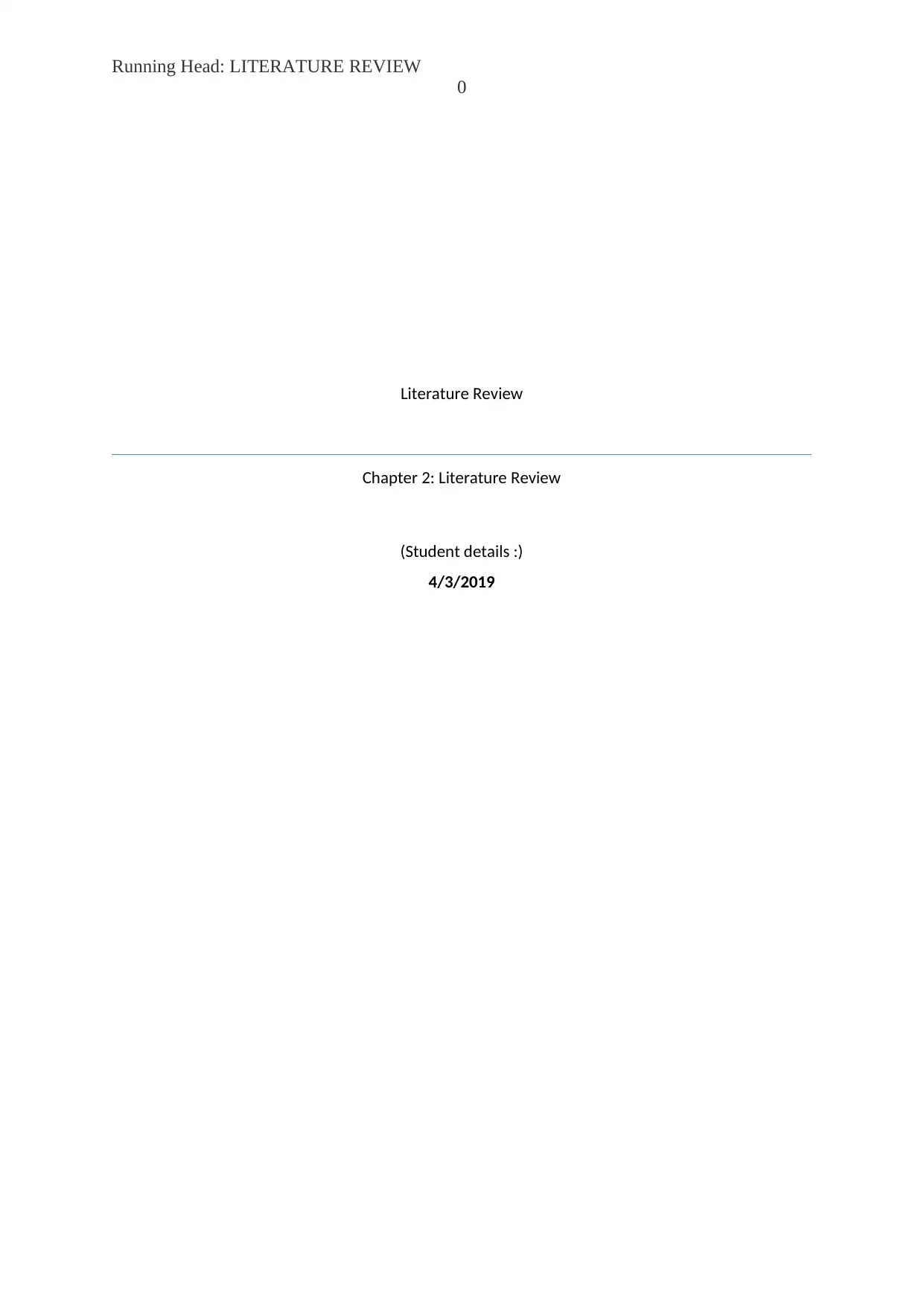
Running Head: LITERATURE REVIEW
0
Literature Review
Chapter 2: Literature Review
(Student details :)
4/3/2019
0
Literature Review
Chapter 2: Literature Review
(Student details :)
4/3/2019
Paraphrase This Document
Need a fresh take? Get an instant paraphrase of this document with our AI Paraphraser

Literature Review
1
Contents
Chapter 2: Literature Review (LR)............................................................................................2
Introduction............................................................................................................................2
Benefits of Motoring Eco-friendly Cars in Developed Countries.........................................2
Summary................................................................................................................................7
References..................................................................................................................................8
1
Contents
Chapter 2: Literature Review (LR)............................................................................................2
Introduction............................................................................................................................2
Benefits of Motoring Eco-friendly Cars in Developed Countries.........................................2
Summary................................................................................................................................7
References..................................................................................................................................8
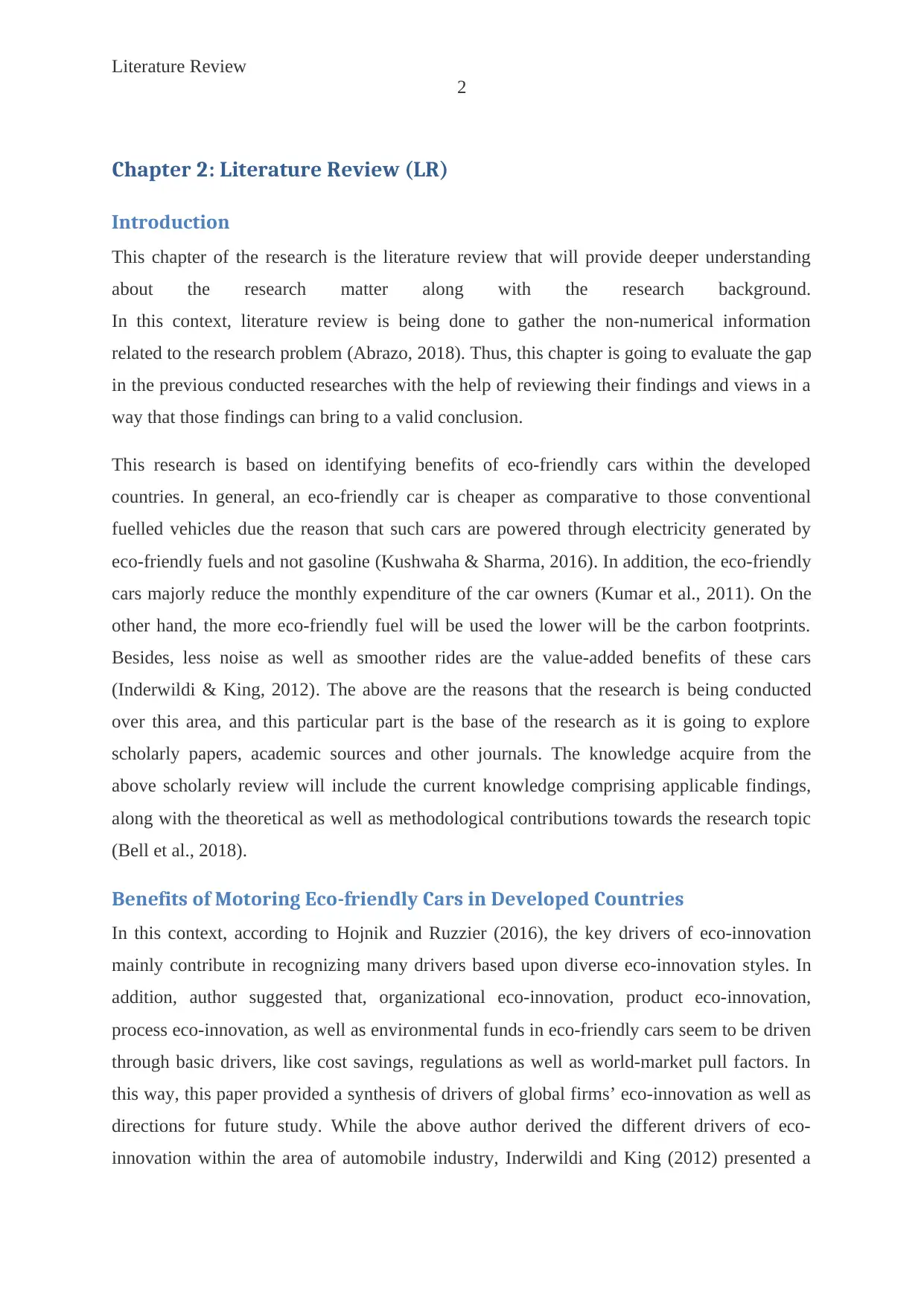
Literature Review
2
Chapter 2: Literature Review (LR)
Introduction
This chapter of the research is the literature review that will provide deeper understanding
about the research matter along with the research background.
In this context, literature review is being done to gather the non-numerical information
related to the research problem (Abrazo, 2018). Thus, this chapter is going to evaluate the gap
in the previous conducted researches with the help of reviewing their findings and views in a
way that those findings can bring to a valid conclusion.
This research is based on identifying benefits of eco-friendly cars within the developed
countries. In general, an eco-friendly car is cheaper as comparative to those conventional
fuelled vehicles due the reason that such cars are powered through electricity generated by
eco-friendly fuels and not gasoline (Kushwaha & Sharma, 2016). In addition, the eco-friendly
cars majorly reduce the monthly expenditure of the car owners (Kumar et al., 2011). On the
other hand, the more eco-friendly fuel will be used the lower will be the carbon footprints.
Besides, less noise as well as smoother rides are the value-added benefits of these cars
(Inderwildi & King, 2012). The above are the reasons that the research is being conducted
over this area, and this particular part is the base of the research as it is going to explore
scholarly papers, academic sources and other journals. The knowledge acquire from the
above scholarly review will include the current knowledge comprising applicable findings,
along with the theoretical as well as methodological contributions towards the research topic
(Bell et al., 2018).
Benefits of Motoring Eco-friendly Cars in Developed Countries
In this context, according to Hojnik and Ruzzier (2016), the key drivers of eco-innovation
mainly contribute in recognizing many drivers based upon diverse eco-innovation styles. In
addition, author suggested that, organizational eco-innovation, product eco-innovation,
process eco-innovation, as well as environmental funds in eco-friendly cars seem to be driven
through basic drivers, like cost savings, regulations as well as world-market pull factors. In
this way, this paper provided a synthesis of drivers of global firms’ eco-innovation as well as
directions for future study. While the above author derived the different drivers of eco-
innovation within the area of automobile industry, Inderwildi and King (2012) presented a
2
Chapter 2: Literature Review (LR)
Introduction
This chapter of the research is the literature review that will provide deeper understanding
about the research matter along with the research background.
In this context, literature review is being done to gather the non-numerical information
related to the research problem (Abrazo, 2018). Thus, this chapter is going to evaluate the gap
in the previous conducted researches with the help of reviewing their findings and views in a
way that those findings can bring to a valid conclusion.
This research is based on identifying benefits of eco-friendly cars within the developed
countries. In general, an eco-friendly car is cheaper as comparative to those conventional
fuelled vehicles due the reason that such cars are powered through electricity generated by
eco-friendly fuels and not gasoline (Kushwaha & Sharma, 2016). In addition, the eco-friendly
cars majorly reduce the monthly expenditure of the car owners (Kumar et al., 2011). On the
other hand, the more eco-friendly fuel will be used the lower will be the carbon footprints.
Besides, less noise as well as smoother rides are the value-added benefits of these cars
(Inderwildi & King, 2012). The above are the reasons that the research is being conducted
over this area, and this particular part is the base of the research as it is going to explore
scholarly papers, academic sources and other journals. The knowledge acquire from the
above scholarly review will include the current knowledge comprising applicable findings,
along with the theoretical as well as methodological contributions towards the research topic
(Bell et al., 2018).
Benefits of Motoring Eco-friendly Cars in Developed Countries
In this context, according to Hojnik and Ruzzier (2016), the key drivers of eco-innovation
mainly contribute in recognizing many drivers based upon diverse eco-innovation styles. In
addition, author suggested that, organizational eco-innovation, product eco-innovation,
process eco-innovation, as well as environmental funds in eco-friendly cars seem to be driven
through basic drivers, like cost savings, regulations as well as world-market pull factors. In
this way, this paper provided a synthesis of drivers of global firms’ eco-innovation as well as
directions for future study. While the above author derived the different drivers of eco-
innovation within the area of automobile industry, Inderwildi and King (2012) presented a
⊘ This is a preview!⊘
Do you want full access?
Subscribe today to unlock all pages.

Trusted by 1+ million students worldwide
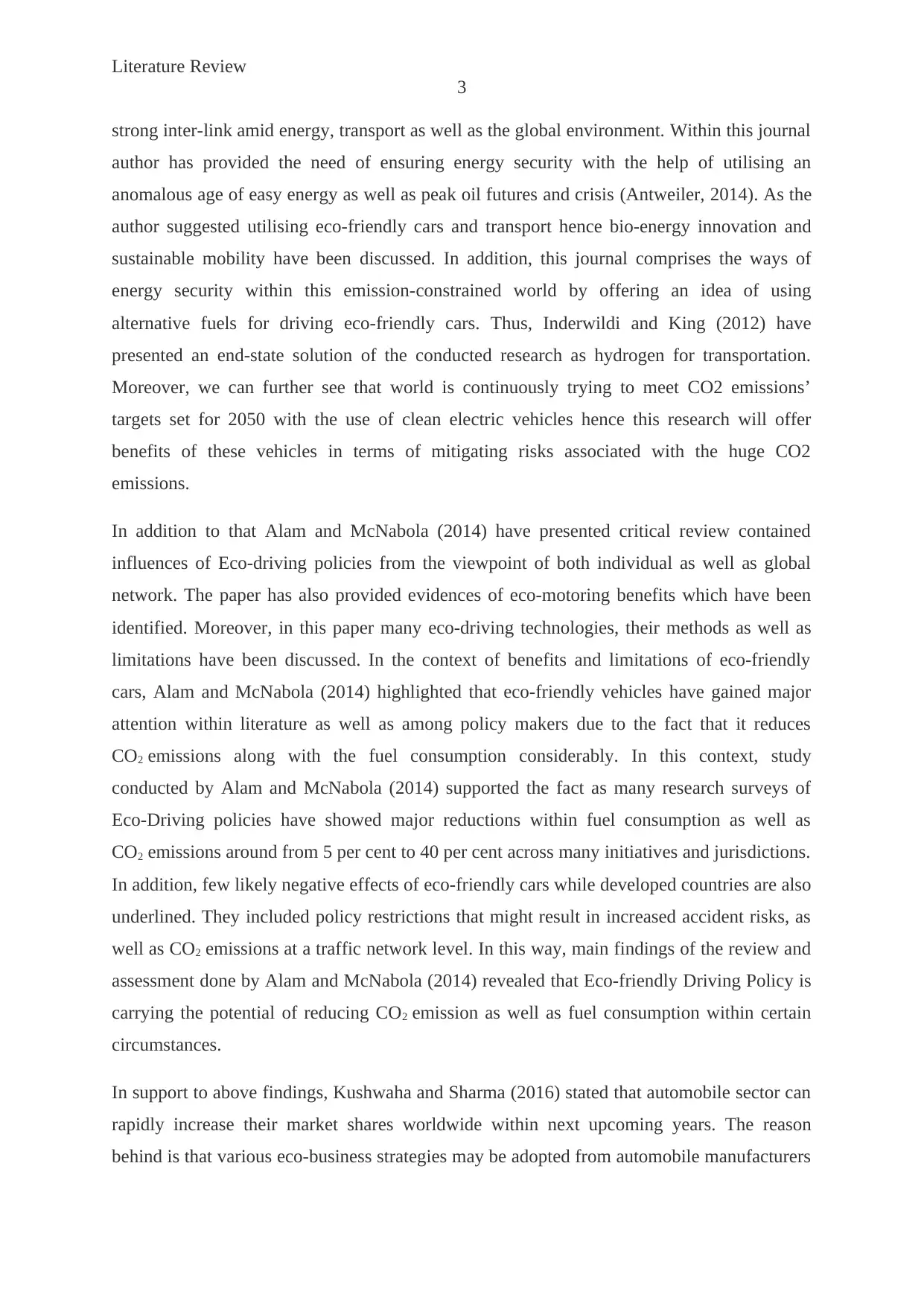
Literature Review
3
strong inter-link amid energy, transport as well as the global environment. Within this journal
author has provided the need of ensuring energy security with the help of utilising an
anomalous age of easy energy as well as peak oil futures and crisis (Antweiler, 2014). As the
author suggested utilising eco-friendly cars and transport hence bio-energy innovation and
sustainable mobility have been discussed. In addition, this journal comprises the ways of
energy security within this emission-constrained world by offering an idea of using
alternative fuels for driving eco-friendly cars. Thus, Inderwildi and King (2012) have
presented an end-state solution of the conducted research as hydrogen for transportation.
Moreover, we can further see that world is continuously trying to meet CO2 emissions’
targets set for 2050 with the use of clean electric vehicles hence this research will offer
benefits of these vehicles in terms of mitigating risks associated with the huge CO2
emissions.
In addition to that Alam and McNabola (2014) have presented critical review contained
influences of Eco-driving policies from the viewpoint of both individual as well as global
network. The paper has also provided evidences of eco-motoring benefits which have been
identified. Moreover, in this paper many eco-driving technologies, their methods as well as
limitations have been discussed. In the context of benefits and limitations of eco-friendly
cars, Alam and McNabola (2014) highlighted that eco-friendly vehicles have gained major
attention within literature as well as among policy makers due to the fact that it reduces
CO2 emissions along with the fuel consumption considerably. In this context, study
conducted by Alam and McNabola (2014) supported the fact as many research surveys of
Eco-Driving policies have showed major reductions within fuel consumption as well as
CO2 emissions around from 5 per cent to 40 per cent across many initiatives and jurisdictions.
In addition, few likely negative effects of eco-friendly cars while developed countries are also
underlined. They included policy restrictions that might result in increased accident risks, as
well as CO2 emissions at a traffic network level. In this way, main findings of the review and
assessment done by Alam and McNabola (2014) revealed that Eco-friendly Driving Policy is
carrying the potential of reducing CO2 emission as well as fuel consumption within certain
circumstances.
In support to above findings, Kushwaha and Sharma (2016) stated that automobile sector can
rapidly increase their market shares worldwide within next upcoming years. The reason
behind is that various eco-business strategies may be adopted from automobile manufacturers
3
strong inter-link amid energy, transport as well as the global environment. Within this journal
author has provided the need of ensuring energy security with the help of utilising an
anomalous age of easy energy as well as peak oil futures and crisis (Antweiler, 2014). As the
author suggested utilising eco-friendly cars and transport hence bio-energy innovation and
sustainable mobility have been discussed. In addition, this journal comprises the ways of
energy security within this emission-constrained world by offering an idea of using
alternative fuels for driving eco-friendly cars. Thus, Inderwildi and King (2012) have
presented an end-state solution of the conducted research as hydrogen for transportation.
Moreover, we can further see that world is continuously trying to meet CO2 emissions’
targets set for 2050 with the use of clean electric vehicles hence this research will offer
benefits of these vehicles in terms of mitigating risks associated with the huge CO2
emissions.
In addition to that Alam and McNabola (2014) have presented critical review contained
influences of Eco-driving policies from the viewpoint of both individual as well as global
network. The paper has also provided evidences of eco-motoring benefits which have been
identified. Moreover, in this paper many eco-driving technologies, their methods as well as
limitations have been discussed. In the context of benefits and limitations of eco-friendly
cars, Alam and McNabola (2014) highlighted that eco-friendly vehicles have gained major
attention within literature as well as among policy makers due to the fact that it reduces
CO2 emissions along with the fuel consumption considerably. In this context, study
conducted by Alam and McNabola (2014) supported the fact as many research surveys of
Eco-Driving policies have showed major reductions within fuel consumption as well as
CO2 emissions around from 5 per cent to 40 per cent across many initiatives and jurisdictions.
In addition, few likely negative effects of eco-friendly cars while developed countries are also
underlined. They included policy restrictions that might result in increased accident risks, as
well as CO2 emissions at a traffic network level. In this way, main findings of the review and
assessment done by Alam and McNabola (2014) revealed that Eco-friendly Driving Policy is
carrying the potential of reducing CO2 emission as well as fuel consumption within certain
circumstances.
In support to above findings, Kushwaha and Sharma (2016) stated that automobile sector can
rapidly increase their market shares worldwide within next upcoming years. The reason
behind is that various eco-business strategies may be adopted from automobile manufacturers
Paraphrase This Document
Need a fresh take? Get an instant paraphrase of this document with our AI Paraphraser
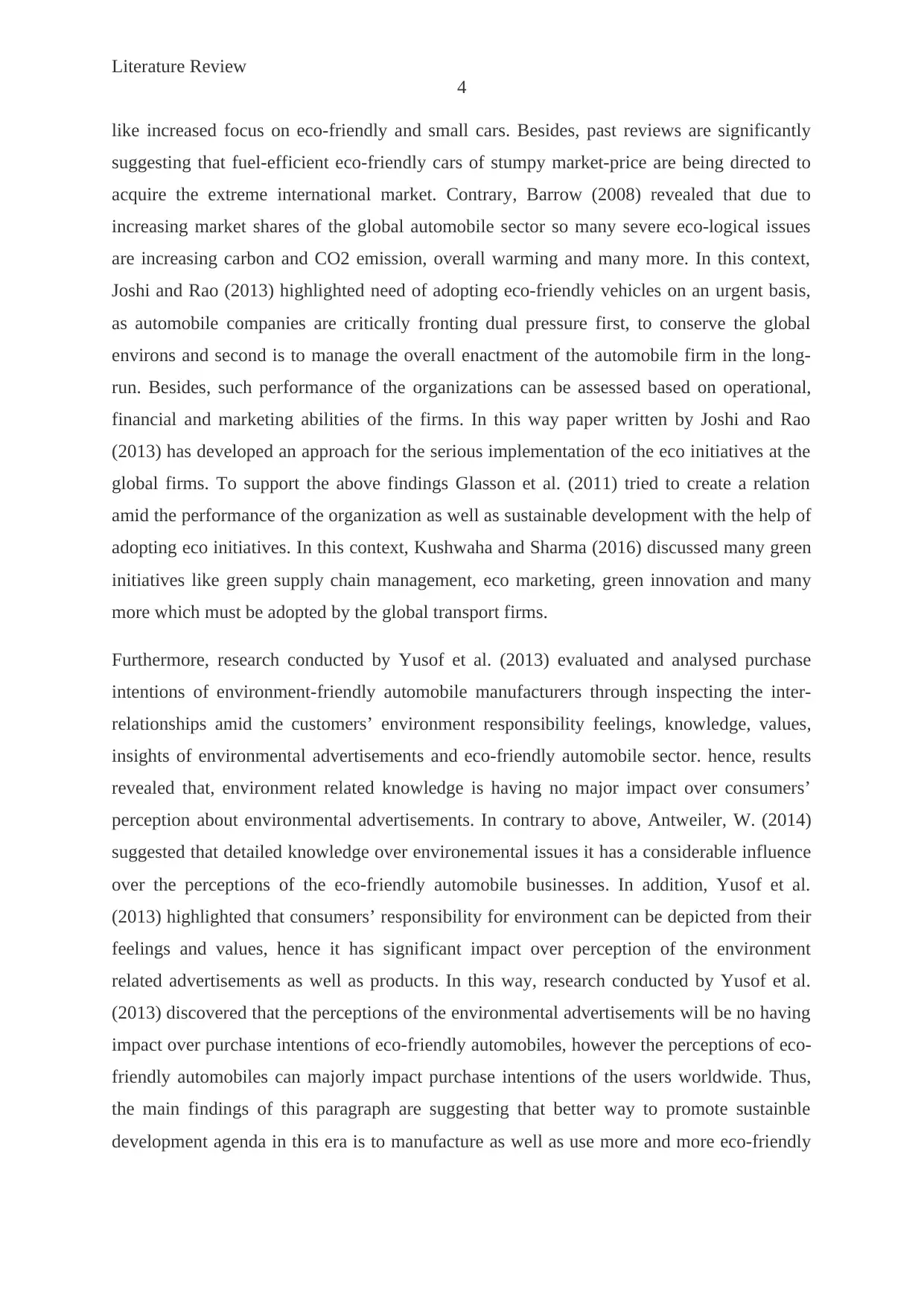
Literature Review
4
like increased focus on eco-friendly and small cars. Besides, past reviews are significantly
suggesting that fuel-efficient eco-friendly cars of stumpy market-price are being directed to
acquire the extreme international market. Contrary, Barrow (2008) revealed that due to
increasing market shares of the global automobile sector so many severe eco-logical issues
are increasing carbon and CO2 emission, overall warming and many more. In this context,
Joshi and Rao (2013) highlighted need of adopting eco-friendly vehicles on an urgent basis,
as automobile companies are critically fronting dual pressure first, to conserve the global
environs and second is to manage the overall enactment of the automobile firm in the long-
run. Besides, such performance of the organizations can be assessed based on operational,
financial and marketing abilities of the firms. In this way paper written by Joshi and Rao
(2013) has developed an approach for the serious implementation of the eco initiatives at the
global firms. To support the above findings Glasson et al. (2011) tried to create a relation
amid the performance of the organization as well as sustainable development with the help of
adopting eco initiatives. In this context, Kushwaha and Sharma (2016) discussed many green
initiatives like green supply chain management, eco marketing, green innovation and many
more which must be adopted by the global transport firms.
Furthermore, research conducted by Yusof et al. (2013) evaluated and analysed purchase
intentions of environment-friendly automobile manufacturers through inspecting the inter-
relationships amid the customers’ environment responsibility feelings, knowledge, values,
insights of environmental advertisements and eco-friendly automobile sector. hence, results
revealed that, environment related knowledge is having no major impact over consumers’
perception about environmental advertisements. In contrary to above, Antweiler, W. (2014)
suggested that detailed knowledge over environemental issues it has a considerable influence
over the perceptions of the eco-friendly automobile businesses. In addition, Yusof et al.
(2013) highlighted that consumers’ responsibility for environment can be depicted from their
feelings and values, hence it has significant impact over perception of the environment
related advertisements as well as products. In this way, research conducted by Yusof et al.
(2013) discovered that the perceptions of the environmental advertisements will be no having
impact over purchase intentions of eco-friendly automobiles, however the perceptions of eco-
friendly automobiles can majorly impact purchase intentions of the users worldwide. Thus,
the main findings of this paragraph are suggesting that better way to promote sustainble
development agenda in this era is to manufacture as well as use more and more eco-friendly
4
like increased focus on eco-friendly and small cars. Besides, past reviews are significantly
suggesting that fuel-efficient eco-friendly cars of stumpy market-price are being directed to
acquire the extreme international market. Contrary, Barrow (2008) revealed that due to
increasing market shares of the global automobile sector so many severe eco-logical issues
are increasing carbon and CO2 emission, overall warming and many more. In this context,
Joshi and Rao (2013) highlighted need of adopting eco-friendly vehicles on an urgent basis,
as automobile companies are critically fronting dual pressure first, to conserve the global
environs and second is to manage the overall enactment of the automobile firm in the long-
run. Besides, such performance of the organizations can be assessed based on operational,
financial and marketing abilities of the firms. In this way paper written by Joshi and Rao
(2013) has developed an approach for the serious implementation of the eco initiatives at the
global firms. To support the above findings Glasson et al. (2011) tried to create a relation
amid the performance of the organization as well as sustainable development with the help of
adopting eco initiatives. In this context, Kushwaha and Sharma (2016) discussed many green
initiatives like green supply chain management, eco marketing, green innovation and many
more which must be adopted by the global transport firms.
Furthermore, research conducted by Yusof et al. (2013) evaluated and analysed purchase
intentions of environment-friendly automobile manufacturers through inspecting the inter-
relationships amid the customers’ environment responsibility feelings, knowledge, values,
insights of environmental advertisements and eco-friendly automobile sector. hence, results
revealed that, environment related knowledge is having no major impact over consumers’
perception about environmental advertisements. In contrary to above, Antweiler, W. (2014)
suggested that detailed knowledge over environemental issues it has a considerable influence
over the perceptions of the eco-friendly automobile businesses. In addition, Yusof et al.
(2013) highlighted that consumers’ responsibility for environment can be depicted from their
feelings and values, hence it has significant impact over perception of the environment
related advertisements as well as products. In this way, research conducted by Yusof et al.
(2013) discovered that the perceptions of the environmental advertisements will be no having
impact over purchase intentions of eco-friendly automobiles, however the perceptions of eco-
friendly automobiles can majorly impact purchase intentions of the users worldwide. Thus,
the main findings of this paragraph are suggesting that better way to promote sustainble
development agenda in this era is to manufacture as well as use more and more eco-friendly
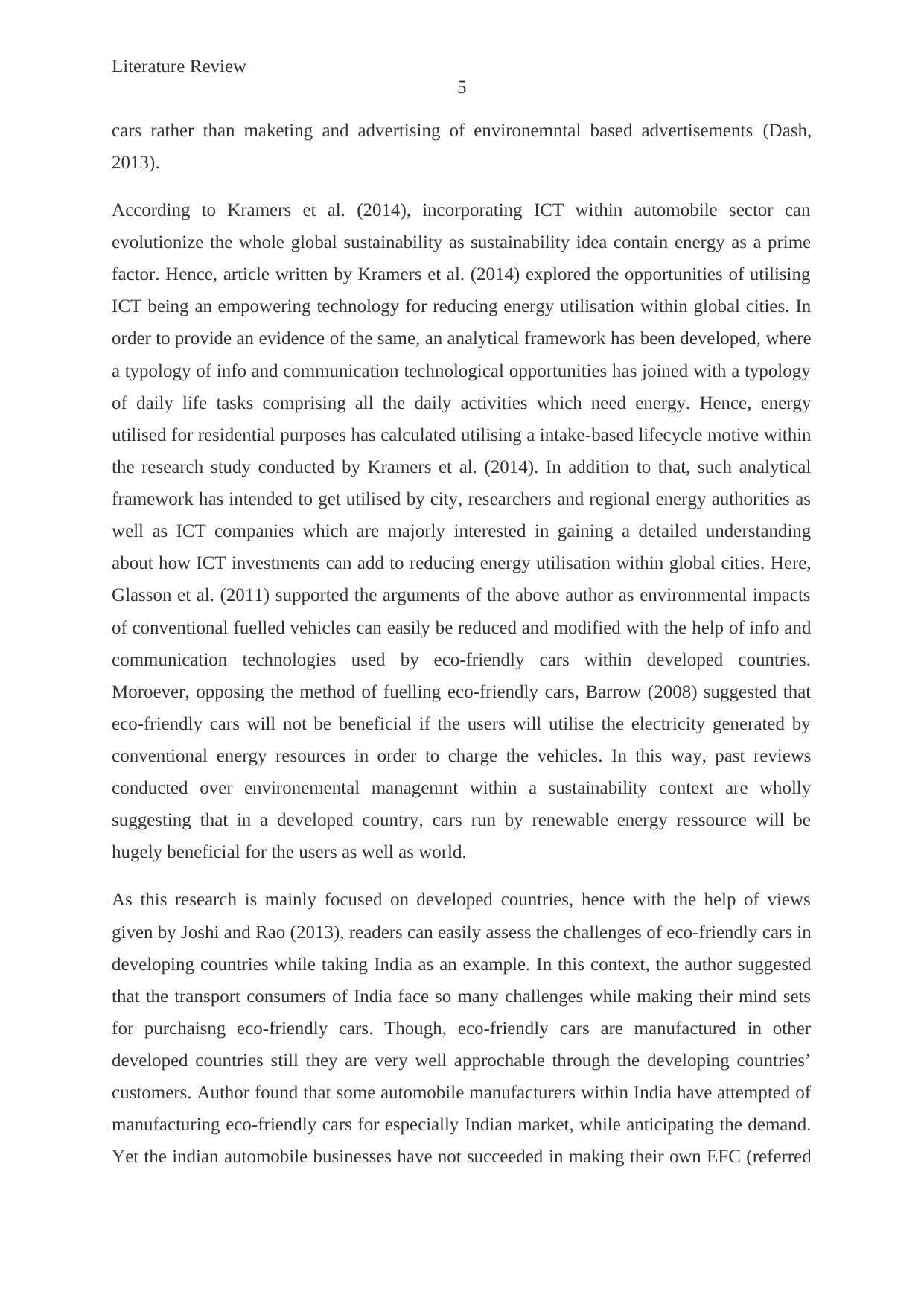
Literature Review
5
cars rather than maketing and advertising of environemntal based advertisements (Dash,
2013).
According to Kramers et al. (2014), incorporating ICT within automobile sector can
evolutionize the whole global sustainability as sustainability idea contain energy as a prime
factor. Hence, article written by Kramers et al. (2014) explored the opportunities of utilising
ICT being an empowering technology for reducing energy utilisation within global cities. In
order to provide an evidence of the same, an analytical framework has been developed, where
a typology of info and communication technological opportunities has joined with a typology
of daily life tasks comprising all the daily activities which need energy. Hence, energy
utilised for residential purposes has calculated utilising a intake-based lifecycle motive within
the research study conducted by Kramers et al. (2014). In addition to that, such analytical
framework has intended to get utilised by city, researchers and regional energy authorities as
well as ICT companies which are majorly interested in gaining a detailed understanding
about how ICT investments can add to reducing energy utilisation within global cities. Here,
Glasson et al. (2011) supported the arguments of the above author as environmental impacts
of conventional fuelled vehicles can easily be reduced and modified with the help of info and
communication technologies used by eco-friendly cars within developed countries.
Moroever, opposing the method of fuelling eco-friendly cars, Barrow (2008) suggested that
eco-friendly cars will not be beneficial if the users will utilise the electricity generated by
conventional energy resources in order to charge the vehicles. In this way, past reviews
conducted over environemental managemnt within a sustainability context are wholly
suggesting that in a developed country, cars run by renewable energy ressource will be
hugely beneficial for the users as well as world.
As this research is mainly focused on developed countries, hence with the help of views
given by Joshi and Rao (2013), readers can easily assess the challenges of eco-friendly cars in
developing countries while taking India as an example. In this context, the author suggested
that the transport consumers of India face so many challenges while making their mind sets
for purchaisng eco-friendly cars. Though, eco-friendly cars are manufactured in other
developed countries still they are very well approchable through the developing countries’
customers. Author found that some automobile manufacturers within India have attempted of
manufacturing eco-friendly cars for especially Indian market, while anticipating the demand.
Yet the indian automobile businesses have not succeeded in making their own EFC (referred
5
cars rather than maketing and advertising of environemntal based advertisements (Dash,
2013).
According to Kramers et al. (2014), incorporating ICT within automobile sector can
evolutionize the whole global sustainability as sustainability idea contain energy as a prime
factor. Hence, article written by Kramers et al. (2014) explored the opportunities of utilising
ICT being an empowering technology for reducing energy utilisation within global cities. In
order to provide an evidence of the same, an analytical framework has been developed, where
a typology of info and communication technological opportunities has joined with a typology
of daily life tasks comprising all the daily activities which need energy. Hence, energy
utilised for residential purposes has calculated utilising a intake-based lifecycle motive within
the research study conducted by Kramers et al. (2014). In addition to that, such analytical
framework has intended to get utilised by city, researchers and regional energy authorities as
well as ICT companies which are majorly interested in gaining a detailed understanding
about how ICT investments can add to reducing energy utilisation within global cities. Here,
Glasson et al. (2011) supported the arguments of the above author as environmental impacts
of conventional fuelled vehicles can easily be reduced and modified with the help of info and
communication technologies used by eco-friendly cars within developed countries.
Moroever, opposing the method of fuelling eco-friendly cars, Barrow (2008) suggested that
eco-friendly cars will not be beneficial if the users will utilise the electricity generated by
conventional energy resources in order to charge the vehicles. In this way, past reviews
conducted over environemental managemnt within a sustainability context are wholly
suggesting that in a developed country, cars run by renewable energy ressource will be
hugely beneficial for the users as well as world.
As this research is mainly focused on developed countries, hence with the help of views
given by Joshi and Rao (2013), readers can easily assess the challenges of eco-friendly cars in
developing countries while taking India as an example. In this context, the author suggested
that the transport consumers of India face so many challenges while making their mind sets
for purchaisng eco-friendly cars. Though, eco-friendly cars are manufactured in other
developed countries still they are very well approchable through the developing countries’
customers. Author found that some automobile manufacturers within India have attempted of
manufacturing eco-friendly cars for especially Indian market, while anticipating the demand.
Yet the indian automobile businesses have not succeeded in making their own EFC (referred
⊘ This is a preview!⊘
Do you want full access?
Subscribe today to unlock all pages.

Trusted by 1+ million students worldwide
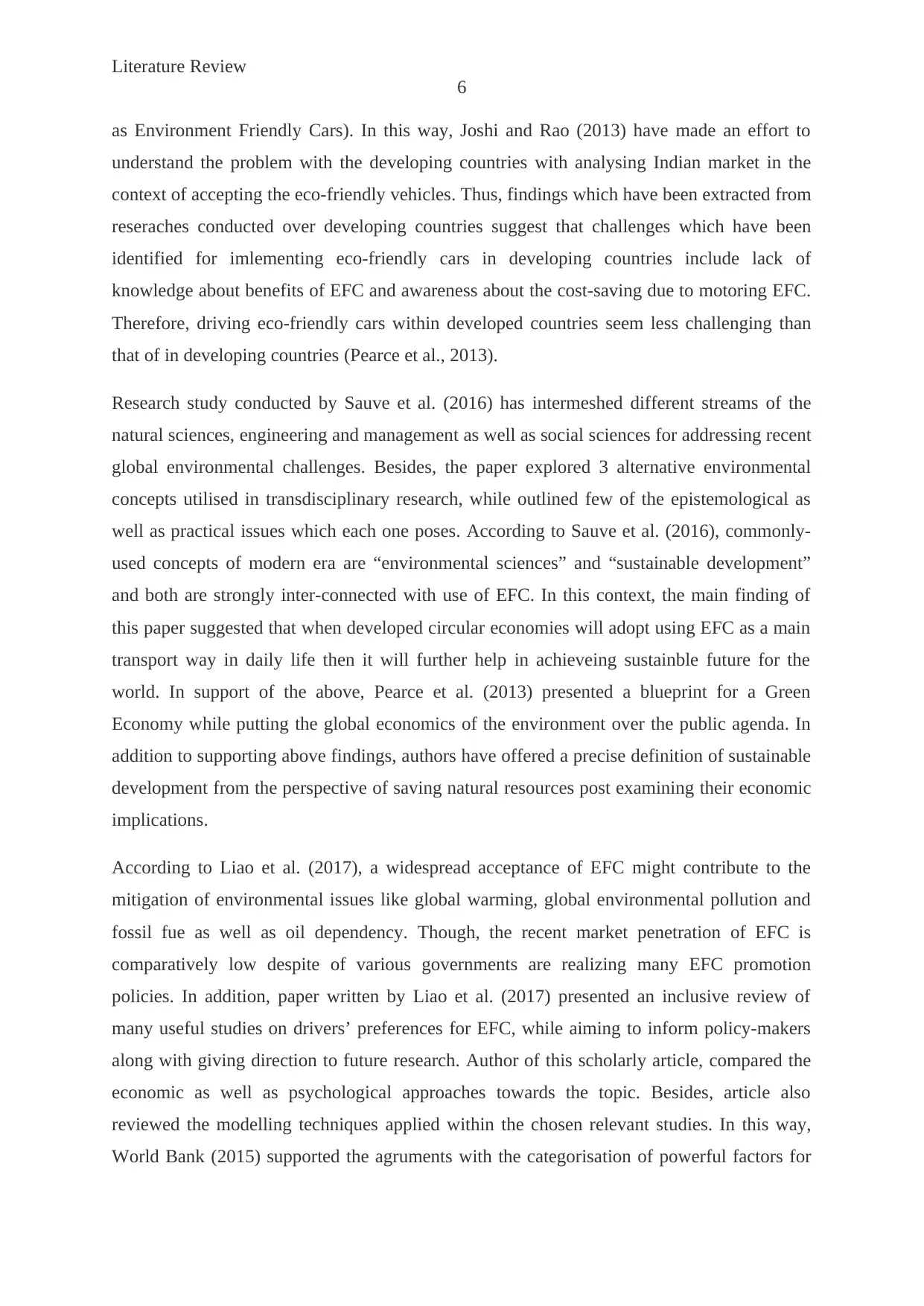
Literature Review
6
as Environment Friendly Cars). In this way, Joshi and Rao (2013) have made an effort to
understand the problem with the developing countries with analysing Indian market in the
context of accepting the eco-friendly vehicles. Thus, findings which have been extracted from
reseraches conducted over developing countries suggest that challenges which have been
identified for imlementing eco-friendly cars in developing countries include lack of
knowledge about benefits of EFC and awareness about the cost-saving due to motoring EFC.
Therefore, driving eco-friendly cars within developed countries seem less challenging than
that of in developing countries (Pearce et al., 2013).
Research study conducted by Sauve et al. (2016) has intermeshed different streams of the
natural sciences, engineering and management as well as social sciences for addressing recent
global environmental challenges. Besides, the paper explored 3 alternative environmental
concepts utilised in transdisciplinary research, while outlined few of the epistemological as
well as practical issues which each one poses. According to Sauve et al. (2016), commonly-
used concepts of modern era are “environmental sciences” and “sustainable development”
and both are strongly inter-connected with use of EFC. In this context, the main finding of
this paper suggested that when developed circular economies will adopt using EFC as a main
transport way in daily life then it will further help in achieveing sustainble future for the
world. In support of the above, Pearce et al. (2013) presented a blueprint for a Green
Economy while putting the global economics of the environment over the public agenda. In
addition to supporting above findings, authors have offered a precise definition of sustainable
development from the perspective of saving natural resources post examining their economic
implications.
According to Liao et al. (2017), a widespread acceptance of EFC might contribute to the
mitigation of environmental issues like global warming, global environmental pollution and
fossil fue as well as oil dependency. Though, the recent market penetration of EFC is
comparatively low despite of various governments are realizing many EFC promotion
policies. In addition, paper written by Liao et al. (2017) presented an inclusive review of
many useful studies on drivers’ preferences for EFC, while aiming to inform policy-makers
along with giving direction to future research. Author of this scholarly article, compared the
economic as well as psychological approaches towards the topic. Besides, article also
reviewed the modelling techniques applied within the chosen relevant studies. In this way,
World Bank (2015) supported the agruments with the categorisation of powerful factors for
6
as Environment Friendly Cars). In this way, Joshi and Rao (2013) have made an effort to
understand the problem with the developing countries with analysing Indian market in the
context of accepting the eco-friendly vehicles. Thus, findings which have been extracted from
reseraches conducted over developing countries suggest that challenges which have been
identified for imlementing eco-friendly cars in developing countries include lack of
knowledge about benefits of EFC and awareness about the cost-saving due to motoring EFC.
Therefore, driving eco-friendly cars within developed countries seem less challenging than
that of in developing countries (Pearce et al., 2013).
Research study conducted by Sauve et al. (2016) has intermeshed different streams of the
natural sciences, engineering and management as well as social sciences for addressing recent
global environmental challenges. Besides, the paper explored 3 alternative environmental
concepts utilised in transdisciplinary research, while outlined few of the epistemological as
well as practical issues which each one poses. According to Sauve et al. (2016), commonly-
used concepts of modern era are “environmental sciences” and “sustainable development”
and both are strongly inter-connected with use of EFC. In this context, the main finding of
this paper suggested that when developed circular economies will adopt using EFC as a main
transport way in daily life then it will further help in achieveing sustainble future for the
world. In support of the above, Pearce et al. (2013) presented a blueprint for a Green
Economy while putting the global economics of the environment over the public agenda. In
addition to supporting above findings, authors have offered a precise definition of sustainable
development from the perspective of saving natural resources post examining their economic
implications.
According to Liao et al. (2017), a widespread acceptance of EFC might contribute to the
mitigation of environmental issues like global warming, global environmental pollution and
fossil fue as well as oil dependency. Though, the recent market penetration of EFC is
comparatively low despite of various governments are realizing many EFC promotion
policies. In addition, paper written by Liao et al. (2017) presented an inclusive review of
many useful studies on drivers’ preferences for EFC, while aiming to inform policy-makers
along with giving direction to future research. Author of this scholarly article, compared the
economic as well as psychological approaches towards the topic. Besides, article also
reviewed the modelling techniques applied within the chosen relevant studies. In this way,
World Bank (2015) supported the agruments with the categorisation of powerful factors for
Paraphrase This Document
Need a fresh take? Get an instant paraphrase of this document with our AI Paraphraser
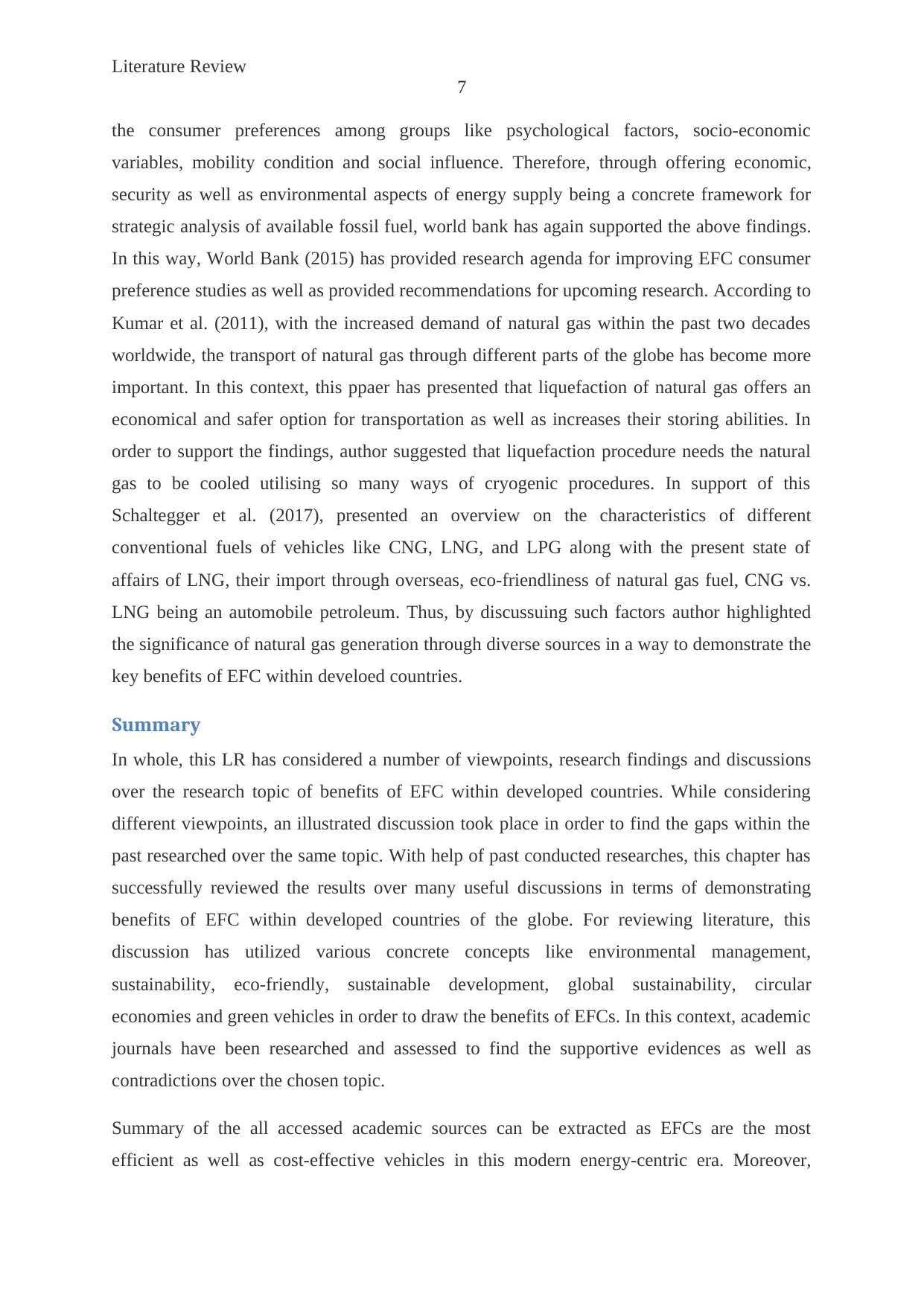
Literature Review
7
the consumer preferences among groups like psychological factors, socio-economic
variables, mobility condition and social influence. Therefore, through offering economic,
security as well as environmental aspects of energy supply being a concrete framework for
strategic analysis of available fossil fuel, world bank has again supported the above findings.
In this way, World Bank (2015) has provided research agenda for improving EFC consumer
preference studies as well as provided recommendations for upcoming research. According to
Kumar et al. (2011), with the increased demand of natural gas within the past two decades
worldwide, the transport of natural gas through different parts of the globe has become more
important. In this context, this ppaer has presented that liquefaction of natural gas offers an
economical and safer option for transportation as well as increases their storing abilities. In
order to support the findings, author suggested that liquefaction procedure needs the natural
gas to be cooled utilising so many ways of cryogenic procedures. In support of this
Schaltegger et al. (2017), presented an overview on the characteristics of different
conventional fuels of vehicles like CNG, LNG, and LPG along with the present state of
affairs of LNG, their import through overseas, eco-friendliness of natural gas fuel, CNG vs.
LNG being an automobile petroleum. Thus, by discussuing such factors author highlighted
the significance of natural gas generation through diverse sources in a way to demonstrate the
key benefits of EFC within develoed countries.
Summary
In whole, this LR has considered a number of viewpoints, research findings and discussions
over the research topic of benefits of EFC within developed countries. While considering
different viewpoints, an illustrated discussion took place in order to find the gaps within the
past researched over the same topic. With help of past conducted researches, this chapter has
successfully reviewed the results over many useful discussions in terms of demonstrating
benefits of EFC within developed countries of the globe. For reviewing literature, this
discussion has utilized various concrete concepts like environmental management,
sustainability, eco-friendly, sustainable development, global sustainability, circular
economies and green vehicles in order to draw the benefits of EFCs. In this context, academic
journals have been researched and assessed to find the supportive evidences as well as
contradictions over the chosen topic.
Summary of the all accessed academic sources can be extracted as EFCs are the most
efficient as well as cost-effective vehicles in this modern energy-centric era. Moreover,
7
the consumer preferences among groups like psychological factors, socio-economic
variables, mobility condition and social influence. Therefore, through offering economic,
security as well as environmental aspects of energy supply being a concrete framework for
strategic analysis of available fossil fuel, world bank has again supported the above findings.
In this way, World Bank (2015) has provided research agenda for improving EFC consumer
preference studies as well as provided recommendations for upcoming research. According to
Kumar et al. (2011), with the increased demand of natural gas within the past two decades
worldwide, the transport of natural gas through different parts of the globe has become more
important. In this context, this ppaer has presented that liquefaction of natural gas offers an
economical and safer option for transportation as well as increases their storing abilities. In
order to support the findings, author suggested that liquefaction procedure needs the natural
gas to be cooled utilising so many ways of cryogenic procedures. In support of this
Schaltegger et al. (2017), presented an overview on the characteristics of different
conventional fuels of vehicles like CNG, LNG, and LPG along with the present state of
affairs of LNG, their import through overseas, eco-friendliness of natural gas fuel, CNG vs.
LNG being an automobile petroleum. Thus, by discussuing such factors author highlighted
the significance of natural gas generation through diverse sources in a way to demonstrate the
key benefits of EFC within develoed countries.
Summary
In whole, this LR has considered a number of viewpoints, research findings and discussions
over the research topic of benefits of EFC within developed countries. While considering
different viewpoints, an illustrated discussion took place in order to find the gaps within the
past researched over the same topic. With help of past conducted researches, this chapter has
successfully reviewed the results over many useful discussions in terms of demonstrating
benefits of EFC within developed countries of the globe. For reviewing literature, this
discussion has utilized various concrete concepts like environmental management,
sustainability, eco-friendly, sustainable development, global sustainability, circular
economies and green vehicles in order to draw the benefits of EFCs. In this context, academic
journals have been researched and assessed to find the supportive evidences as well as
contradictions over the chosen topic.
Summary of the all accessed academic sources can be extracted as EFCs are the most
efficient as well as cost-effective vehicles in this modern energy-centric era. Moreover,

Literature Review
8
discussion has been able to draw main findings drawn within the last decade within the area
of research field. In addition, EFCs are playing an important role while building,
strengthening and evolving global economies with the help of providing an economic way to
transport as well as energy conservation. Finally, this chapter has successfully found the gap
within the several research studies and assessed the gap in order to take help while
conducting this research aiming to get the best results.
8
discussion has been able to draw main findings drawn within the last decade within the area
of research field. In addition, EFCs are playing an important role while building,
strengthening and evolving global economies with the help of providing an economic way to
transport as well as energy conservation. Finally, this chapter has successfully found the gap
within the several research studies and assessed the gap in order to take help while
conducting this research aiming to get the best results.
⊘ This is a preview!⊘
Do you want full access?
Subscribe today to unlock all pages.

Trusted by 1+ million students worldwide
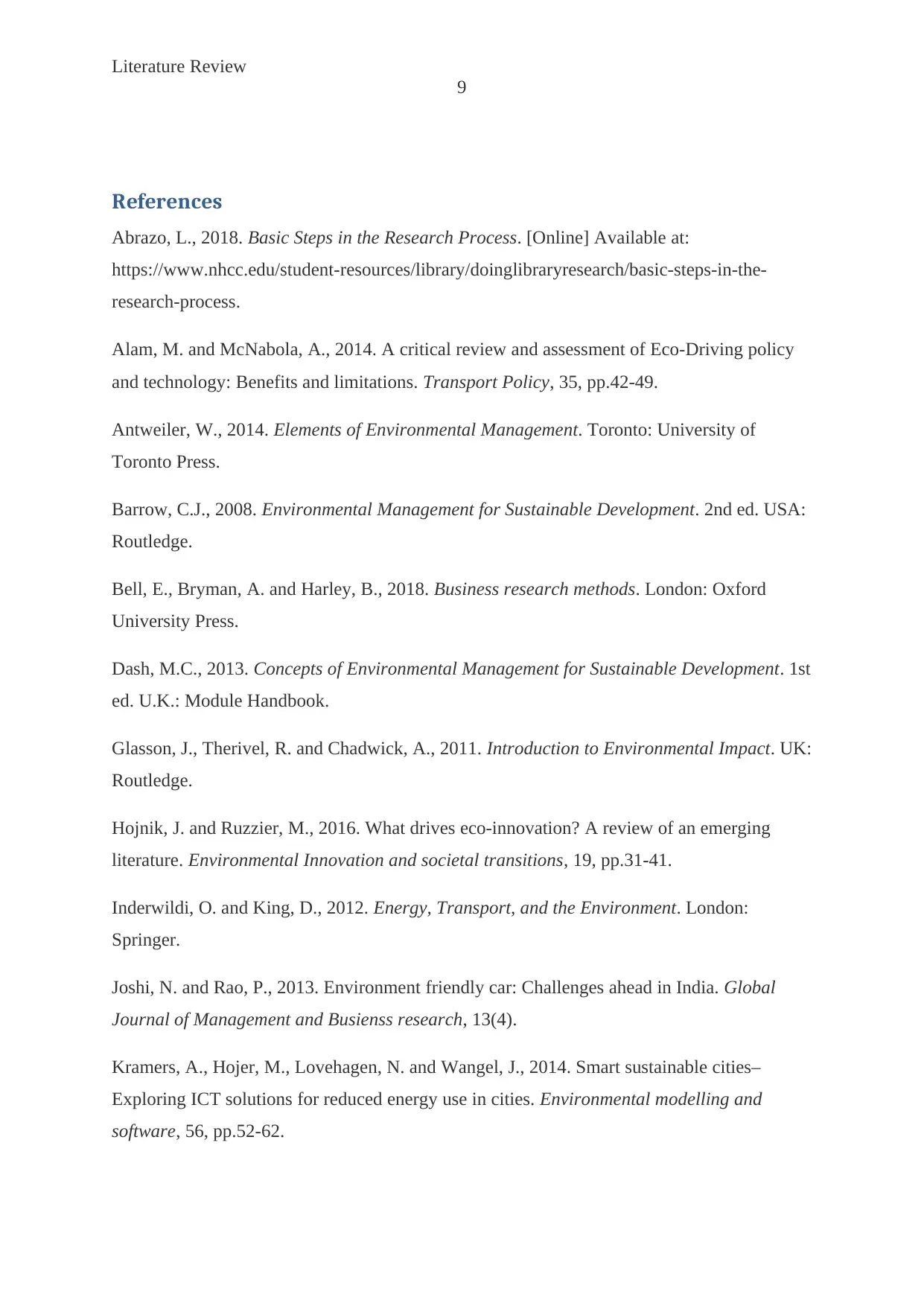
Literature Review
9
References
Abrazo, L., 2018. Basic Steps in the Research Process. [Online] Available at:
https://www.nhcc.edu/student-resources/library/doinglibraryresearch/basic-steps-in-the-
research-process.
Alam, M. and McNabola, A., 2014. A critical review and assessment of Eco-Driving policy
and technology: Benefits and limitations. Transport Policy, 35, pp.42-49.
Antweiler, W., 2014. Elements of Environmental Management. Toronto: University of
Toronto Press.
Barrow, C.J., 2008. Environmental Management for Sustainable Development. 2nd ed. USA:
Routledge.
Bell, E., Bryman, A. and Harley, B., 2018. Business research methods. London: Oxford
University Press.
Dash, M.C., 2013. Concepts of Environmental Management for Sustainable Development. 1st
ed. U.K.: Module Handbook.
Glasson, J., Therivel, R. and Chadwick, A., 2011. Introduction to Environmental Impact. UK:
Routledge.
Hojnik, J. and Ruzzier, M., 2016. What drives eco-innovation? A review of an emerging
literature. Environmental Innovation and societal transitions, 19, pp.31-41.
Inderwildi, O. and King, D., 2012. Energy, Transport, and the Environment. London:
Springer.
Joshi, N. and Rao, P., 2013. Environment friendly car: Challenges ahead in India. Global
Journal of Management and Busienss research, 13(4).
Kramers, A., Hojer, M., Lovehagen, N. and Wangel, J., 2014. Smart sustainable cities–
Exploring ICT solutions for reduced energy use in cities. Environmental modelling and
software, 56, pp.52-62.
9
References
Abrazo, L., 2018. Basic Steps in the Research Process. [Online] Available at:
https://www.nhcc.edu/student-resources/library/doinglibraryresearch/basic-steps-in-the-
research-process.
Alam, M. and McNabola, A., 2014. A critical review and assessment of Eco-Driving policy
and technology: Benefits and limitations. Transport Policy, 35, pp.42-49.
Antweiler, W., 2014. Elements of Environmental Management. Toronto: University of
Toronto Press.
Barrow, C.J., 2008. Environmental Management for Sustainable Development. 2nd ed. USA:
Routledge.
Bell, E., Bryman, A. and Harley, B., 2018. Business research methods. London: Oxford
University Press.
Dash, M.C., 2013. Concepts of Environmental Management for Sustainable Development. 1st
ed. U.K.: Module Handbook.
Glasson, J., Therivel, R. and Chadwick, A., 2011. Introduction to Environmental Impact. UK:
Routledge.
Hojnik, J. and Ruzzier, M., 2016. What drives eco-innovation? A review of an emerging
literature. Environmental Innovation and societal transitions, 19, pp.31-41.
Inderwildi, O. and King, D., 2012. Energy, Transport, and the Environment. London:
Springer.
Joshi, N. and Rao, P., 2013. Environment friendly car: Challenges ahead in India. Global
Journal of Management and Busienss research, 13(4).
Kramers, A., Hojer, M., Lovehagen, N. and Wangel, J., 2014. Smart sustainable cities–
Exploring ICT solutions for reduced energy use in cities. Environmental modelling and
software, 56, pp.52-62.
Paraphrase This Document
Need a fresh take? Get an instant paraphrase of this document with our AI Paraphraser
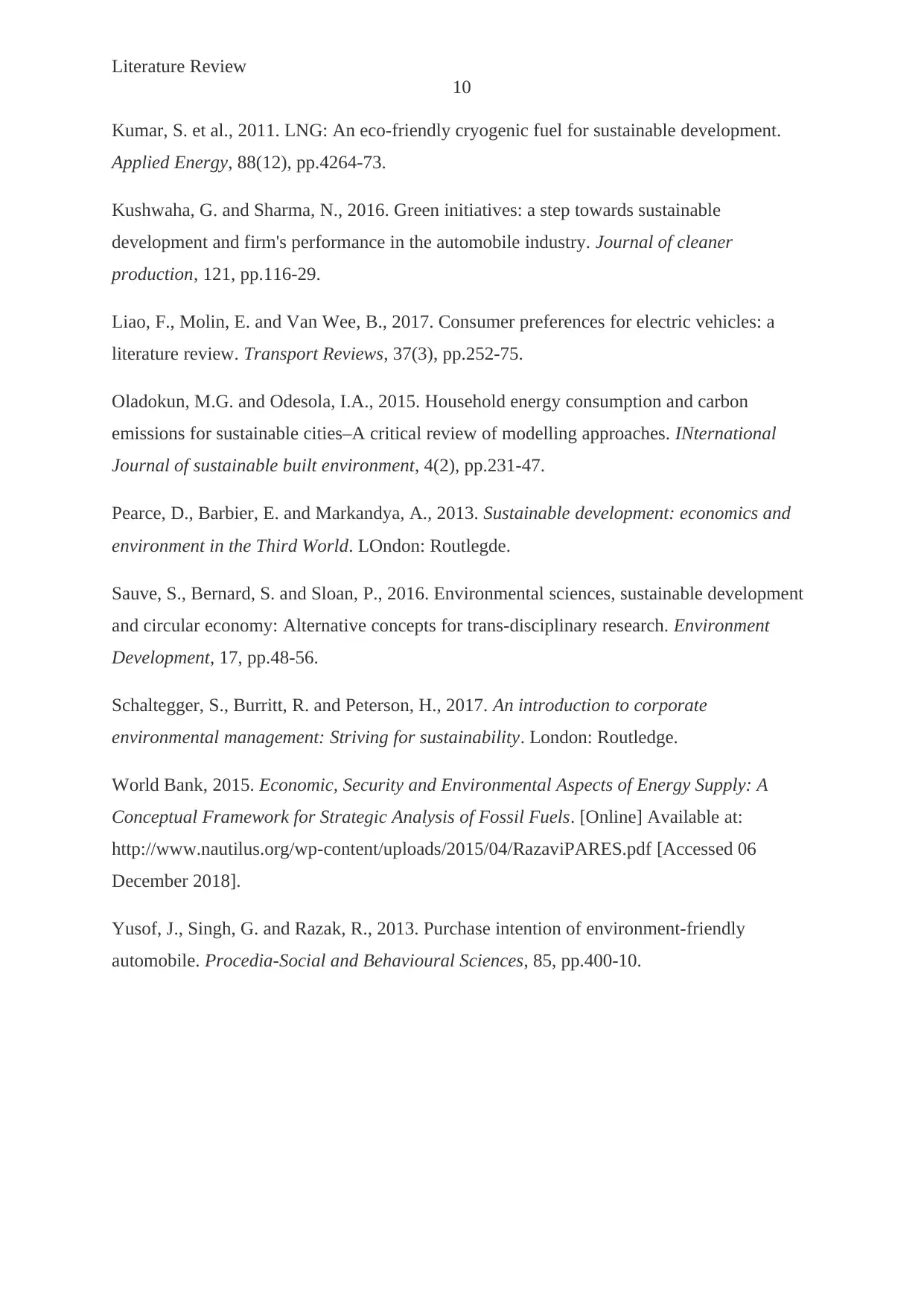
Literature Review
10
Kumar, S. et al., 2011. LNG: An eco-friendly cryogenic fuel for sustainable development.
Applied Energy, 88(12), pp.4264-73.
Kushwaha, G. and Sharma, N., 2016. Green initiatives: a step towards sustainable
development and firm's performance in the automobile industry. Journal of cleaner
production, 121, pp.116-29.
Liao, F., Molin, E. and Van Wee, B., 2017. Consumer preferences for electric vehicles: a
literature review. Transport Reviews, 37(3), pp.252-75.
Oladokun, M.G. and Odesola, I.A., 2015. Household energy consumption and carbon
emissions for sustainable cities–A critical review of modelling approaches. INternational
Journal of sustainable built environment, 4(2), pp.231-47.
Pearce, D., Barbier, E. and Markandya, A., 2013. Sustainable development: economics and
environment in the Third World. LOndon: Routlegde.
Sauve, S., Bernard, S. and Sloan, P., 2016. Environmental sciences, sustainable development
and circular economy: Alternative concepts for trans-disciplinary research. Environment
Development, 17, pp.48-56.
Schaltegger, S., Burritt, R. and Peterson, H., 2017. An introduction to corporate
environmental management: Striving for sustainability. London: Routledge.
World Bank, 2015. Economic, Security and Environmental Aspects of Energy Supply: A
Conceptual Framework for Strategic Analysis of Fossil Fuels. [Online] Available at:
http://www.nautilus.org/wp-content/uploads/2015/04/RazaviPARES.pdf [Accessed 06
December 2018].
Yusof, J., Singh, G. and Razak, R., 2013. Purchase intention of environment-friendly
automobile. Procedia-Social and Behavioural Sciences, 85, pp.400-10.
10
Kumar, S. et al., 2011. LNG: An eco-friendly cryogenic fuel for sustainable development.
Applied Energy, 88(12), pp.4264-73.
Kushwaha, G. and Sharma, N., 2016. Green initiatives: a step towards sustainable
development and firm's performance in the automobile industry. Journal of cleaner
production, 121, pp.116-29.
Liao, F., Molin, E. and Van Wee, B., 2017. Consumer preferences for electric vehicles: a
literature review. Transport Reviews, 37(3), pp.252-75.
Oladokun, M.G. and Odesola, I.A., 2015. Household energy consumption and carbon
emissions for sustainable cities–A critical review of modelling approaches. INternational
Journal of sustainable built environment, 4(2), pp.231-47.
Pearce, D., Barbier, E. and Markandya, A., 2013. Sustainable development: economics and
environment in the Third World. LOndon: Routlegde.
Sauve, S., Bernard, S. and Sloan, P., 2016. Environmental sciences, sustainable development
and circular economy: Alternative concepts for trans-disciplinary research. Environment
Development, 17, pp.48-56.
Schaltegger, S., Burritt, R. and Peterson, H., 2017. An introduction to corporate
environmental management: Striving for sustainability. London: Routledge.
World Bank, 2015. Economic, Security and Environmental Aspects of Energy Supply: A
Conceptual Framework for Strategic Analysis of Fossil Fuels. [Online] Available at:
http://www.nautilus.org/wp-content/uploads/2015/04/RazaviPARES.pdf [Accessed 06
December 2018].
Yusof, J., Singh, G. and Razak, R., 2013. Purchase intention of environment-friendly
automobile. Procedia-Social and Behavioural Sciences, 85, pp.400-10.
1 out of 11
Related Documents
Your All-in-One AI-Powered Toolkit for Academic Success.
+13062052269
info@desklib.com
Available 24*7 on WhatsApp / Email
![[object Object]](/_next/static/media/star-bottom.7253800d.svg)
Unlock your academic potential
Copyright © 2020–2026 A2Z Services. All Rights Reserved. Developed and managed by ZUCOL.





